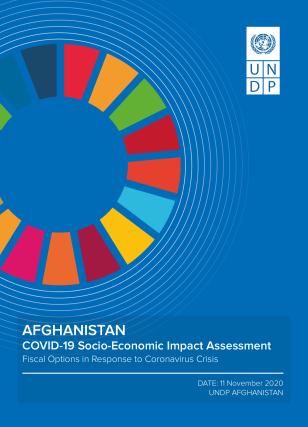Country Note IV - Fiscal Options in Response to Coronavirus Crisis

Country Note IV - Fiscal Options in Response to Coronavirus Crisis
November 10, 2020
The note is the fourth of a series of Country Notes that examine the likely effects of the coronavirus outbreak in Afghanistan with a focus on the fiscal implications of COVID-19. The note is prepared using Computable General Equilibrium Models developed by UNDP for Afghanistan. These notes are intended to provide the policy makers with the evidence to better understand the trade-offs, and provide policy recommendations to mitigate the social and economic impacts of the pandemic.
Due to the lack of fiscal space, until now support from international donors has been necessary for emergency interventions to fight COVID-19, because both domestic capacity and sufficient funds were lacking. Although the future course of COVID-19 is uncertain, in the short-term, capacity and funding will remain insufficient to support recovery and sustainable economic growth over the long-term. Moreover, the level of donor support has been declining in recent years. If this trend continues, and if there are no significant policy changes, the economic situation in Afghanistan will deteriorate further.
The pandemic has required significant fiscal adjustments to be made. Some recurrent and development expenditures were reallocated towards COVID-19 response activities, including social protection and healthcare interventions to fight the pandemic. This has proved insufficient and had an adverse impact both on the quality of the health services that can be provided and the achievement of the planned development agenda of the Government. For example, routine health services and non-communicable disease case management have been particularly hard hit. As a result, progress towards the achievement of some SDG-3 targets has been set back.
The United Nations Development Programme (UNDP) Afghanistan Country Office has produced three Country Notes assessing the impact of COVID-19 on the economy and on the SDGs. This fourth note focuses on possible fiscal policy measures to mobilize additional resources to support recovery in the health sector while mitigating the adverse impact of the pandemic on Afghanistan’s economy. Alternative fiscal policy measures in alleviating the negative impact of the pandemic were simulated using a UNDP Single Country CGE (Computable General Equilibrium) model that represents the Afghan economy in 2018.
These model simulations also estimate a total fiscal loss relative to a pre-COVID baseline projection by the IMF, ranging from 12 percent in 2020 alone, to around 18 percent by 2024, with the average over all scenarios amounting to 16 percent over the whole period. Based on UNDP model simulations, to cover the economic losses caused by the pandemic with roughly unchanged policies except for the immediate response to the pandemic, Afghanistan would need approximately 30 percent more revenue in grants from the international community over the coming five years (around 460 billion Afg or 5.98 billion USD) to maintain the level of expenditures initially planned in the IMF projections.
According to the World Bank, the fiscal deficit is expected to increase even with new COVID-19 related grant support (of around USD 500 million) in 2020. The World Bank expects the budget deficit to be financed through increased withdrawals from the Government’s existing cash reserves (around 26.5 billion Afg, 344 million USD), a recent disbursement of 16.8 billion Afg (218 million USD) from the IMF’s Rapid Credit Facility, and additional concessional borrowing of 11.6 billion Afg (150 million USD). This would increase the external debt stock that had already reached around 12 percent of GDP.
External borrowing even at a concessional rate is not the optimal financing option in the medium-term. Afghanistan is assessed to have a weak carrying capacity by the IMF Debt Sustainability Assessment developed in 2018.
UNDP is supporting Afghan government in the prudent use of debt and in selecting bankable projects that would help economic performance while maintaining debt sustainability.
Furthermore, the stability of the exchange rate, which is of essential importance, could be undermined by higher debt service obligations that would erode the central bank’s reserves, since most of Afghanistan’s debt is denominated in foreign currency.
UNDP model simulations highlight the need for the continued support from international donors in the form of grants to keep the country moving towards greater self-reliance—reinforcing the views expressed by the World Bank and other International Financial Institutions (IFIs).

 Locations
Locations




